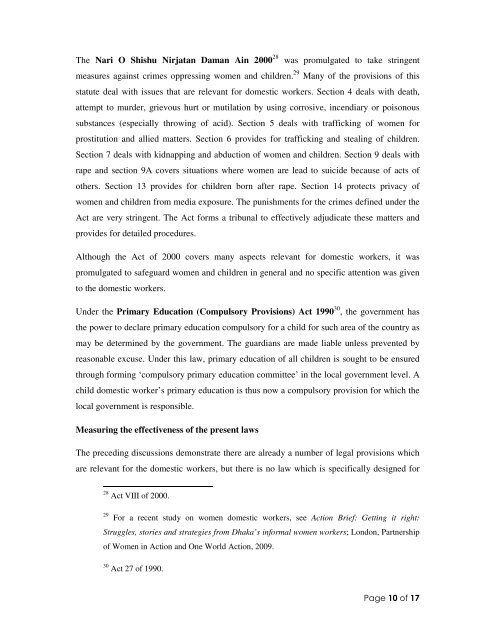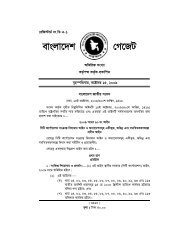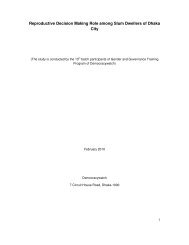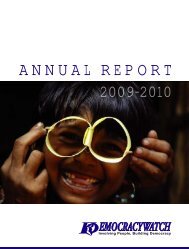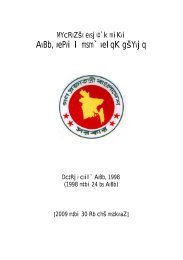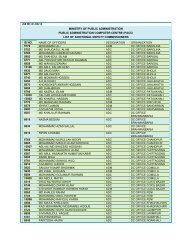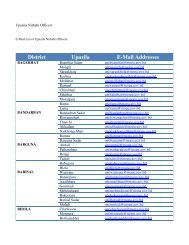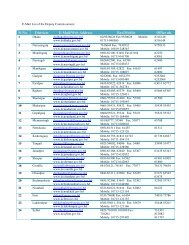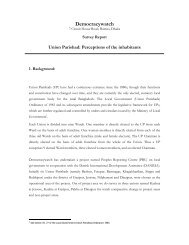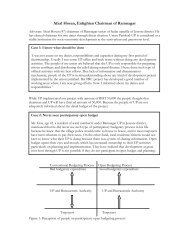Safeguarding the rights of domestic workers: Existing laws and ways ...
Safeguarding the rights of domestic workers: Existing laws and ways ...
Safeguarding the rights of domestic workers: Existing laws and ways ...
Create successful ePaper yourself
Turn your PDF publications into a flip-book with our unique Google optimized e-Paper software.
The Nari O Shishu Nirjatan Daman Ain 2000 28<br />
was promulgated to take stringent<br />
measures against crimes oppressing women <strong>and</strong> children. 29 Many <strong>of</strong> <strong>the</strong> provisions <strong>of</strong> this<br />
statute deal with issues that are relevant for <strong>domestic</strong> <strong>workers</strong>. Section 4 deals with death,<br />
attempt to murder, grievous hurt or mutilation by using corrosive, incendiary or poisonous<br />
substances (especially throwing <strong>of</strong> acid). Section 5 deals with trafficking <strong>of</strong> women for<br />
prostitution <strong>and</strong> allied matters. Section 6 provides for trafficking <strong>and</strong> stealing <strong>of</strong> children.<br />
Section 7 deals with kidnapping <strong>and</strong> abduction <strong>of</strong> women <strong>and</strong> children. Section 9 deals with<br />
rape <strong>and</strong> section 9A covers situations where women are lead to suicide because <strong>of</strong> acts <strong>of</strong><br />
o<strong>the</strong>rs. Section 13 provides for children born after rape. Section 14 protects privacy <strong>of</strong><br />
women <strong>and</strong> children from media exposure. The punishments for <strong>the</strong> crimes defined under <strong>the</strong><br />
Act are very stringent. The Act forms a tribunal to effectively adjudicate <strong>the</strong>se matters <strong>and</strong><br />
provides for detailed procedures.<br />
Although <strong>the</strong> Act <strong>of</strong> 2000 covers many aspects relevant for <strong>domestic</strong> <strong>workers</strong>, it was<br />
promulgated to safeguard women <strong>and</strong> children in general <strong>and</strong> no specific attention was given<br />
to <strong>the</strong> <strong>domestic</strong> <strong>workers</strong>.<br />
Under <strong>the</strong> Primary Education (Compulsory Provisions) Act 1990 30 , <strong>the</strong> government has<br />
<strong>the</strong> power to declare primary education compulsory for a child for such area <strong>of</strong> <strong>the</strong> country as<br />
may be determined by <strong>the</strong> government. The guardians are made liable unless prevented by<br />
reasonable excuse. Under this law, primary education <strong>of</strong> all children is sought to be ensured<br />
through forming ‘compulsory primary education committee’ in <strong>the</strong> local government level. A<br />
child <strong>domestic</strong> worker’s primary education is thus now a compulsory provision for which <strong>the</strong><br />
local government is responsible.<br />
Measuring <strong>the</strong> effectiveness <strong>of</strong> <strong>the</strong> present <strong>laws</strong><br />
The preceding discussions demonstrate <strong>the</strong>re are already a number <strong>of</strong> legal provisions which<br />
are relevant for <strong>the</strong> <strong>domestic</strong> <strong>workers</strong>, but <strong>the</strong>re is no law which is specifically designed for<br />
<br />
28 Act VIII <strong>of</strong> 2000.<br />
29 For a recent study on women <strong>domestic</strong> <strong>workers</strong>, see Action Brief: Getting it right:<br />
Struggles, stories <strong>and</strong> strategies from Dhaka’s informal women <strong>workers</strong>; London, Partnership<br />
<strong>of</strong> Women in Action <strong>and</strong> One World Action, 2009.<br />
30 Act 27 <strong>of</strong> 1990.


